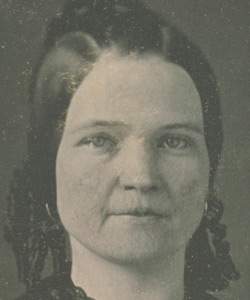Mary Lincoln, Character (American National Biography)
Scholarship
In addition to her role as a mother and housewife, Lincoln was absorbed in politics and worked to promote her husband's career. She wrote patronage letters, advocated his election, and even followed legislative choices in his senatorial campaigns. After Abraham Lincoln was elected president in 1860, she ambitiously sought for herself the role of an influential first lady. Wearing stunning gowns and shawls, she tried to define American fashion. She tastefully renovated the White House, especially the downstairs public rooms, and entertained at parties designed to display to foreign ambassadors the power of the Union. She established an informal American salon, where public men and literary figures discussed the topics of the day. Besides these extensions of domestic roles, Lincoln sought a controversial voice in her husband's patronage appointments, including his cabinet…A vivacious belle in her youth, the short, plump Lincoln was an important and controversial first lady who expanded that role's authority. Stepping outside of the traditional female role of homemaker into the male-dominated world of public affairs, she was often criticized for her behavior. Extravagant, high-strung, and tempestuous, she nonetheless played an important role in her husband's ascent to the presidency and made the unpaid but demanding position of first lady into a post of influence.
Jean H. Baker, "Lincoln, Mary Todd," American National Biography Online, February 2000, http://www.anb.org/articles/04/04-00632.html.
Mary Todd Lincoln, During the Civil War (American National Biography)
Scholarship
Mary Lincoln's tenure as a first lady coincided with the Civil War. During her first days in the White House, when Confederate units were unopposed in northern Virginia, army officials encouraged her to leave the city, but she insisted on staying and even accompanied her husband on tours of the Washington defenses. Like many other women, she nursed soldiers in hospitals, often inscribing their dictated letters to relatives in the North. Lincoln was unusual in her commitment to raising money for the support of impoverished former slaves ("contraband"), who crowded into Washington. However, her good works never stilled the criticism of her extravagance when the allowance for the White House was exceeded, nor did she ever shake the gossip that, because her half brothers fought for the Confederacy, she was a spy.
John H. Baker, "Lincoln, Mary Todd," American National Biography Online, February 2000, http://www.anb.org/articles/04/04-00632.html.
Mary Todd Lincoln (Dictionary of American Biography)
Reference
During the presidency of her husband, Mrs. Lincoln, in what Stoddard called her “somewhat authoritative” way, gave special attention to levees and other social affairs. A Southern lady in the White House, she was subjected to criticism, much of which was gossip and malicious slander; certainly the imputations of disloyalty were unfounded. Even the touches of social gayety with which she relieved the strain of wartime anxiety were criticized as inappropriate. She suffered during the war by reason of divisions in her own family (her sister’s husband, Ben. H. Helm, being a Confederate general), and by the crushing bereavement of her son Willie’s death.
Dumas Malone, ed., Dictionary of American Biography (New York: Charles Scribner’s Sons, 1961), 6: 266.
Mary Todd Lincoln (Holloway, 1881)
Reference
To Mrs. Lincoln more than to any other President's wife was the White House an ambition. She had ever aspired to reach it, and when it became her home, it was the fruition of a hope long entertained, the gratification of the great desire of her life. In her early youth she repeatedly asserted that she should be a President's wife, and so profoundly impressed was she with this idea, that she calculated the probabilities of such a success with all her male friends. She refused an offer of marriage from Stephen A. Douglas, then a rising young lawyer, doubting his ability to gratify her ambition, and accepted a man who at that time seemed to others the least likely to be the President of the United States.
Laura C. Holloway, Ladies of the White House (Philadelphia: Bradley & Company, 1881), 526.





